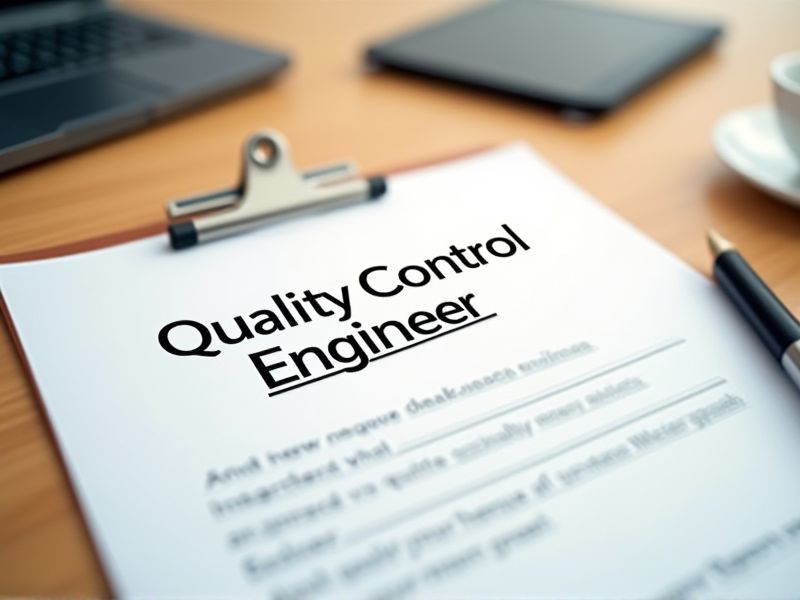
Quality control engineers play a critical role in ensuring that products meet specific standards and regulations. Certifications provide validation of their skills and comprehension in best practices and industry standards. Acquiring these certifications not only enhances their expertise but also increases their value to potential employers. Consider these key certifications that a Quality Control Engineer may need.
ASQ Certified Quality Engineer (CQE)
ASQ Certified Quality Engineer (CQE) provides comprehensive knowledge of quality control principles, enhancing the engineer's problem-solving skills. The certification validates an engineer's capability to implement quality management systems, which is crucial for maintaining product standards. Companies often prefer certified professionals as it ensures adherence to industry best practices and regulatory requirements. Earning a CQE can improve career prospects and lead to higher remuneration by distinguishing the engineer within the profession.
ASQ Certified Quality Auditor (CQA)
The ASQ Certified Quality Auditor (CQA) credential provides quality control engineers with a standardized framework for conducting effective audits, which enhances accountability and consistency in quality processes. CQA certification offers them an in-depth understanding of various quality management systems, making them better equipped to identify and mitigate potential risks in operational processes. With a focus on ethical and efficient audit practices, certified engineers are more adept at ensuring compliance with industry standards and regulations. Organizations benefit as these engineers can drive continuous improvement initiatives, leading to higher product quality and customer satisfaction.
Six Sigma Green Belt Certification
Obtaining a Six Sigma Green Belt Certification equips Quality Control Engineers with skills to reduce process variation, thereby enhancing product quality. The certification provides a structured problem-solving methodology, improving efficiency and productivity in quality management. Engineers with this certification are better positioned to identify cost-saving opportunities, contributing to the financial health of the organization. It fosters a strong foundation in statistical analysis, allowing engineers to make data-driven decisions that enhance performance and customer satisfaction.
Six Sigma Black Belt Certification
Obtaining a Six Sigma Black Belt Certification enhances a Quality Control Engineer's skills in process improvement, enabling them to identify and eliminate defects efficiently. The certification provides in-depth knowledge on data analysis and statistical methodologies, which are crucial for maintaining high-quality standards in manufacturing and production. Employers often seek engineers with this certification as it signifies a commitment to quality and operational excellence. The rigorous training involved fosters leadership abilities, allowing engineers to lead cross-functional teams in tackling complex quality challenges.
Lean Manufacturing Certification
Lean Manufacturing Certification equips Quality Control Engineers with tools for waste reduction, leading to more efficient processes. It enhances the ability to identify and eliminate non-value-adding activities, improving product quality. The certification fosters a culture of continuous improvement, crucial for maintaining competitive advantage. Increased efficiency and quality result in cost savings and higher customer satisfaction.
ISO 9001 Lead Auditor Certification
ISO 9001 Lead Auditor Certification demonstrates a Quality Control Engineer's expertise in quality management systems, enhancing their credibility in quality assurance roles. This certification provides a comprehensive understanding of ISO 9001 standards, enabling engineers to effectively audit and assess organizational processes. With this certification, engineers can identify non-conformities and implement corrective actions, ultimately driving continuous improvement. Companies value this expertise, often leading to advanced career opportunities and increased responsibility for certified individuals.
Total Quality Management (TQM) Certification
Total Quality Management (TQM) Certification equips a Quality Control Engineer with the necessary tools and methodologies to enhance process efficiency. It dramatically reduces defects in production by instilling a structured approach to problem-solving. The certification fosters a culture of continuous improvement, leading to greater customer satisfaction and organizational performance. TQM credentials also increase a professional's value in the job market, allowing for career advancement opportunities.
Certified Reliability Engineer (CRE)
Certified Reliability Engineer (CRE) provides expertise in evaluating and enhancing the reliability of products and processes, which directly boosts the effectiveness of Quality Control Engineers. By utilizing CRE methodologies, such as failure mode and effects analysis (FMEA), quality control processes become more proactive in identifying potential defects. CRE knowledge equips engineers with tools for robust data analysis, leading to data-driven decisions that improve quality metrics. The integration of reliability principles fosters a culture of continual improvement, reinforcing the capability of Quality Control Engineers to meet stringent quality standards.
Certified Manager of Quality/Organizational Excellence (CMQ/OE)
Certification as a Certified Manager of Quality/Organizational Excellence (CMQ/OE) equips a Quality Control Engineer with advanced tools to lead quality initiatives, directly impacting process improvements. This credential demonstrates a recognized level of expertise and commitment, often resulting in increased trust from employers and stakeholders. The comprehensive understanding of quality management systems gained through CMQ/OE certification enables engineers to effectively integrate continuous improvement methodologies, enhancing operational efficiency. Career development is facilitated as the certification often leads to expanded roles and responsibilities within the organization.
Lean Six Sigma Yellow Belt Certification
Lean Six Sigma Yellow Belt Certification equips Quality Control Engineers with essential tools for identifying process inefficiencies, leading to improvement in production quality. Mastery of this methodology aids in reducing waste and increasing operational efficiency, which directly impacts product consistency. Knowledge from the certification can enhance problem-solving skills, critical in maintaining high quality standards in manufacturing. Achieving this certification often aligns with industry requirements, increasing a Quality Control Engineer's value and competitiveness in the job market.
Summary
You, as a reader, will likely recognize that obtaining certifications can enhance a Quality Control Engineer's knowledge and expertise. This increased competence tends to lead to improved accuracy in identifying defects and ensuring product quality. Businesses may see a reduction in errors and production costs as certified professionals bring more efficient problem-solving skills to the table. Certifications can also elevate an engineer's career prospects, potentially resulting in promotions and higher salaries.
